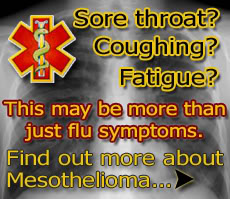MESOTHELIOMA: What is it?
Mesothelioma is a rare kind of malignant cancer that arises from the cells, lining the sacs of the chest (the pleura) or the abdomen (the peritoneum). Pleural mesothelioma is the most common type usually creating symptoms within the chest space. Peritoneal mesothelioma is not common which affects the organs within the abdomen with symptoms that are associated with this body space including abdominal swelling, nausea, vomiting, and bowel obstruction. The rarest form of mesothelioma cancer is pericardial mesothelioma which involves the sac surrounding the guts. Based on the shape of the mesothelioma cells, the specific type of mesothelioma can be diagnosed. There are three kinds of mesothelioma cells: epithelioid, sarcomatoid and biphasic.
MESOTHELIOMA: What Are The Causes?
Exposure to asbestos particles is the primary cause for mesothelioma cancer. A person can get exposed by inhaling or ingesting asbestos fibers, which usually become airborne when asbestos-containing materials are disturbed as in broken for removal. When microscopic fibers are inhaled, they’ll become lodged within the lining of the lungs and these stuck fibers fester for 15-40 years until they become recognized as pleural mesothelioma. When asbestos is ingested, the fibers will become lodged within the lining of the abdomen and eventually cause peritoneal mesothelioma.
MESOTHELIOMA: What Are The Symptoms?
The symptoms for mesothelioma cancer vary depending on the type and the cancer’s location. Because the various forms of the cancer are similarity, several symptoms are common and overlapping. Many patients with mesothelioma will experience shortness of breath and general fatigue. Additionally, acute pain can occur within the chest for patients with pleural and pericardial mesothelioma, and within the abdominal region for patients with peritoneal mesothelioma.
MESOTHELIOMA: What Are The Treatments?
There are several kinds of treatment for patients with malignant mesothelioma, and sometimes they are used in combinations of two or a lot of of those are combined within the course of treatment.
- Surgery: a pleurectomy is the surgical removal of part of the chest or abdomen lining and some of the tissues around it. Sometimes when the mesothelioma cancer has consumed too much tissue, a lung may also be removed in an operation known as a pneumonectomy.
- Radiation Therapy: using high-dose X-rays or alternative high-energy rays to kill cancer cells and shrink tumors. Two types of radiation therapy include: external radiation where a machine outside the body is used, and internal radiation using radioisotopes where putting materials that turn out radiation through skinny tubes inserted into the body space where the cancer cells are located.
- Chemotherapy: using chemotherapeutic agents as medication to fight the cancer. These drugs are administered in one of two ways; 1)systemically through the bloodstream or 2)intrapleurally in the pleural cavity. When it’s administered intrapleurally, the treatment is localized at the location of the tumor. Some of these medication are very toxic, so you must discuss their use thoroughly with your doctor.
- Clinical Trials of new treatments, some non-chemotherapy.
To learn more about mesothelioma cure research and discuss clinical trial options with Dr. Gill.
Related Mesothelioma Articles



